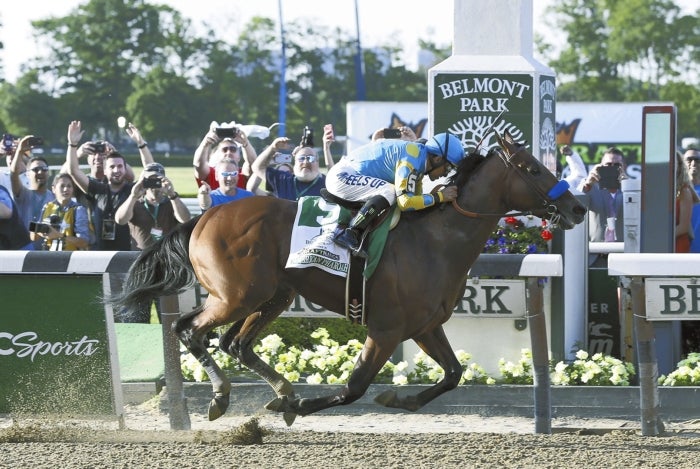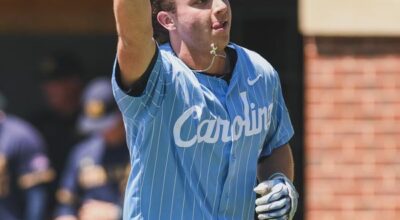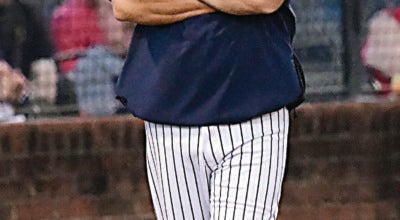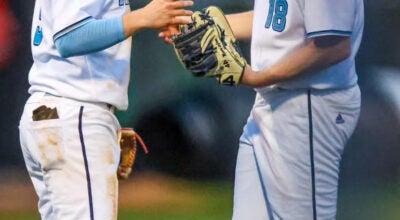Triple Crown: American Pharoah runs into history, ends 37-year wait
Published 12:51 am Sunday, June 7, 2015

- American Pharoah (5) with Victor Espinoza up crosses the finish line to win the 147th running of the Belmont Stakes horse race at Belmont Park, Saturday, June 6, 2015, in Elmont, N.Y. American Pharoah is the first horse to win the Triple Crown since Affirmed won it in 1978. (AP Photo/Seth Wenig)
By Beth Harris
AP Racing Writer
NEW YORK (AP) — By mid-stretch, Bob Baffert knew it. American Pharoah was going to win the Triple Crown.
He took his eyes off the horse to soak in the crazed scene of the packed grandstand. Fans jumped up and down, hugged, and tossed drinks in the air.
The race wasn’t even over yet, and the crowd knew it, too. Thirty-seven years of waiting to see one of the rarest feats in sports was almost over.
“The crowd was just thundering and I was just enjoying the crowd and the noise and everything happening,” the white-haired trainer said. “What a feeling.”
Finally, a Triple Crown winner. And this one was never in doubt.
American Pharoah led all the way to win the Belmont Stakes by 5 1/2 lengths on Saturday, becoming the first horse since 1978 to sweep the Kentucky Derby, Preakness and Belmont Stakes — one of the sporting world’s rarest feats.
“Wow! Wow!” jockey Victor Espinoza said moments after crossing the finish line. “I can only tell you it is just an amazing thing.”
The bay colt with the unusually short tail easily defeated seven rivals in the grueling 1 1/2-mile race, covering the distance in 2:26.65 — sixth-fastest in Belmont history — to end the longest stretch without a Triple Crown champion in history.
“That little horse, he deserved it,” said Baffert, who at 62 is the second-oldest trainer of a Triple Crown winner. “He’s the one that did it. We were basically just passengers.”
American Pharoah is the 12th horse and first since Affirmed in 1978 to win three races on different tracks at varying distances over a five-week span. He won the Derby by one length on May 2 and then romped to a seven-length victory in the rainy Preakness two weeks later before demolishing his rivals Saturday.
Baffert and Espinoza ended their own frustrating histories in the Triple Crown. Baffert finally won on his record fourth Triple try, having lost in 1997, 1998 (by a nose) and in 2002. Espinoza got it done with his record third shot after failing to win in 2002 and last year on California Chrome.
“I was prepared for somebody coming because I’ve been through this so many times,” Baffert said.
Nobody did.
Espinoza hustled American Pharoah to the lead leaving the No. 5 post and quickly got him over to the rail. Materiality was on his outside in second, but never applied any serious pressure traveling along the backstretch before falling away on the second turn.
American Pharoah started kicking away heading into the final turn. He opened up on the field as he powered through the 1,097-yard stretch, displaying his fluid, springloaded stride in which he appears to float over the ground.
“It’s just an amazing feeling that you have when you’re 20 yards from the wire,” Espinoza said. “And then at the wire I was like, ‘I cannot believe I did it.’”
American Pharoah ran the final quarter-mile — a stretch that has dashed numerous Triple Crown dreams — in 24.32 seconds, faster than Secretariat’s time of 25 seconds in winning the 1973 Belmont.
“That’s a hell of a horse,” said Gary Stevens, who finished seventh aboard Tale of Verve. “The race was over in the third jump from the gate.”
After making his way back to the crowd, Espinoza took American Pharoah nearly the length of the sprawling grandstand so fans could pay their respects to the champion.
As the horses were heading to the starting gate, owner Ahmed Zayat was overflowing with confidence and turned to his wife.
“I told her, ‘Get ready to be the owner of the 12th Triple Crown winner,’” he said.
Baffert felt equally good, sensing American Pharoah was on the verge of a winning performance when he saddled the horse in the shady paddock.
“I said to put him on the lead and go for it, and if he doesn’t make it, don’t worry about it,” the trainer said, “but he just kept on rocking and rolling.”
Sent off as the overwhelming 3-5 favorite, American Pharoah paid $3.50, $2.80 and $2.50.
American Pharoah delivered a victory for the Egyptian-born Zayat, who bred the colt and put him up for sale before buying him back for $300,000. His name came from the family’s online contest, in which a woman from Missouri submitted the winning moniker, but the misspelling — it should be pharaoh — wasn’t noticed until the name was already official.
American Pharoah joined the exclusive club of Triple Crown winners Sir Barton (1919), Gallant Fox (1930), Omaha (1935), War Admiral (1937), Whirlaway (1941), Count Fleet (1943), Assault (1946), Citation (1948), Secretariat (1973), Seattle Slew (1977) and Affirmed.
A sign with American Pharoah’s name and silks was quickly put up in the infield next to the 11 other Triple Crown winners.
The crowd of 90,000 — capped to avoid overcrowding and long lines from last year’s total of 102,199 — roared as American Pharoah turned for home.
It’s unlikely the champion heard them since American Pharoah wears ear plugs to block noise that might get him worked up.
Since 1978, the rigors of the Triple Crown had done in 13 other horses who won the Derby and the Preakness — with 12 losing the third leg and I’ll Have Another scratched with a leg injury in 2012. Their failures left the sport and its fans craving a worthy successor to the 11 previous champions.
American Pharoah — his tail shortened after being bitten off on a farm when he was a youngster — turned out to be that horse.
“I was really getting to dislike this trophy — it’s come with a lot of misery,” Baffert said of the sterling silver Triple Crown trophy housed for the last 37 years in the Kentucky Derby museum.
Unlike Affirmed, who dueled Alydar in all three races, American Pharoah didn’t have a specific rival since he was the only horse to run in all three Triple Crown races. Going into the Belmont, American Pharoah had beaten all of his seven challengers before.
And when the race known as “The Test of the Champion” came?
He passed, with flying colors.




